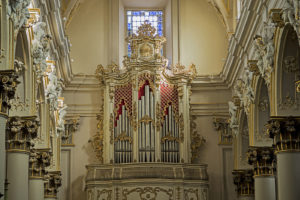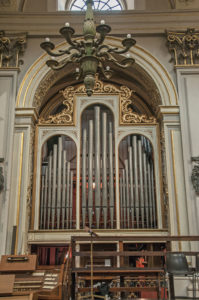On 24 June 1858 the church resounded with festivities.
The great organ was inaugurated, with more than three thousand pipes and a gigantic wooden cantoria (a structure built to house the choir). We can only imagine the sweet sound that accompanied that moment.
The organ still works today and can be found in the right chapel before the transept, while the cantoria was placed above the main portal.
For centuries, music and angelic songs have been an integral part of liturgical functions.


The dark, petroleum-infused pietra pece of the floor smells like petrol and leaves a coat of grease on your fingers like oil!
This unique rock is widely used because its particular composition can make a room resistant to humidity.
The two-tone interior makes the cathedral of San Giovanni Battista (St. John the Baptist) wonderful. The white walls combined with the black floor enhances both elements and adds liveliness to the environment.
Once inside the church of St. John the Baptist, our sense of sight is also stimulated by the colourful altars that crowd the side naves.
Red, green, white, gold, and even the black of the balustrades stimulate the visitor’s eye.